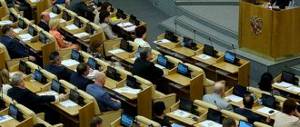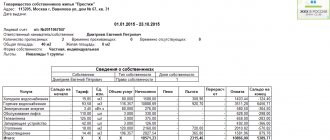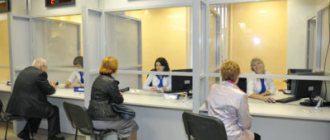Decisions are made by majority, ⅔ or 100% of votes
The quorum for making the majority of decisions at general meetings of owners of premises in an apartment building is fixed in Part 1 of Art. 46 Housing Code of the Russian Federation. This article provides several options for making positive decisions depending on the type of issue:
- by a majority of the total number of votes of the owners in the house participating in the meeting;
- 50%+1 vote of the total number of votes of all owners of premises in an apartment building;
- at least ⅔ votes from the total number of votes of the owners of premises in an apartment building.
In the Housing Code of the Russian Federation there is another option for the number of votes that owners must give for a question at the OSS in order for it to be accepted: 100%, that is, all owners in the house must vote “for” (Clause 1, Part 2, Article 44 of the Housing Code of the Russian Federation , part 1 of article 46 of the Housing Code of the Russian Federation).
The meeting is considered legitimate if it was attended by owners who have more than half of the total number of votes in the house (Part 3 of Article 45 of the Housing Code of the Russian Federation). Let's talk about how many votes are used to make decisions on issues that are most often brought up at general meetings of owners of premises in apartment buildings.
What the Ministry of Construction of the Russian Federation has changed in the requirements for the preparation of OSS protocols
3217046
Number of votes to make a decision
Each resident has a voice. Units (percentage) are equal to the footage of the property. Let's consider an example: a person owns an apartment of 50 m2, and according to the register, the total area of the apartment building is 4000 meters, respectively, out of 4000, 50 are in his competence.
Note: you can count votes at a general meeting of owners using an example, taking into account the proposed formula.
How to hold a homeowners meeting
A third of all votes is sufficient to make a decision. Using a calculator, you can find out that in this situation the number is 1739.
The calculation is made using the formula: divide the total area of the apartment building by 2/3.
That is, at least 35 apartments with this footage must be voted on.
The concept of quorum
Quorum means the number or percentage required for a meeting or session to take place. The number of voting persons should not be less than 2/3 of the total number. To determine the quorum, you need to make a simple calculation.
Example: if the apartment is 43 m2, and the area of the house is 5000, then: 43/5000*100=0.86% (the percentage taken into account in the referendum for this tenant).
Note: in order to vote and then sum up the results, the statement must be certified by all representatives of the counting commission of the housing cooperative in accordance with the provisions reflected in the Charter of the MKD.
Calculator for counting votes at a meeting of apartment building residents
Real estate can be not only an apartment, but also utility rooms. The owners of such areas also have the right to vote. To make the calculations correctly, you can use a calculator.
Often it is created in Excel format yourself or using a tool on the Internet. To do this, you need to type “meeting voting calculator” into the search bar. The World Wide Web will provide several links upon request, from which the desired option is selected. Then, the user needs to set the organization parameters and maintain information.
Simple majority to approve mandatory issues
Mandatory for all general meetings are questions about the selection of the chairman, secretary of the meeting and members of the general commission. This group includes questions about the procedure in which owners are notified about the upcoming meeting and about the decisions made at the general public meeting, if the management organization, homeowners association or residents of the house want to change the procedure established in the Housing Code of the Russian Federation.
Also, meeting participants must determine where copies of the decisions and minutes of the OSS will be stored: this can be done once for all meetings or for each OSS separately.
On these issues, a positive decision is made by a simple majority of the number of votes of the owners present at the meeting, that is, 50% + 1 vote of the number of votes present at the meeting.
Nuances of the event
How to count the votes of owners in an apartment building?
Summarizing today's material, our resource decided to present to readers a number of nuances of the voting procedure at the OSS, which were not previously mentioned. All of them are quite important and require mandatory familiarization. The general list of such features is as follows:
- Summarizing the material presented earlier, we can highlight all the stages in conducting OSS, without which the legality of the collection is called into question. The list is:
- The first stage is the preparation of notices of the general meeting addressed to each owner in the apartment building.
- The second stage is holding the meeting itself, either in person, in absentia, or in absentia.
- The third stage is the preparation of the register (minutes) of the meeting and the counting of votes.
The procedure for further consideration of the decision adopted at the meeting of owners of apartment buildings
- The results obtained during voting at the OSS are used to resolve issues that have arisen and copies of them are sent to the management company, and from there to the State Housing Inspectorate. Taking into account these nuances of the procedure, it is important for its initiator to take care of the legality of the activities being carried out, otherwise the collection will be appealed and useless.
- It is worth considering that minors, even if they are the owner of the apartment building, are voted for by their parents.
- It is important to draw up all protocols, notifications and registers of the OSS in the form established by law. This is discussed in more detail in the orders of the Ministry of Construction and Housing and Communal Services.
- Any decision made at the OSS MKD can be challenged in court by persons interested in it. The main thing in this procedure is to have significant evidence indicating the incompetence and illegality of the votes received.
Otherwise, the general meeting of owners has no nuances. We hope that the material presented today answered your questions. Good luck with your OSS!
You can learn more about the types of general meetings of apartment building owners and its participants by watching the video:
See also Telephone numbers for consultation May 17, 2021 kasjanenko 1133
Share this post
Discussion: 8 comments
- Anna says:
08/03/2017 at 15:01We often have such meetings, but as a rule, everything is in a more simplified form than described in the article. Voting is not always unanimous, but we listen to the opinion of the majority; it has not yet come to court proceedings.
Answer
- pavel says:
12/14/2017 at 15:27
Very clear thank you
Answer
- Valentina says:
03/02/2018 at 08:30
In our new building, a meeting was held on the initiative of the owner, who did not notify each owner by letter, but hung a notice in the entrance. In addition, the same notice hung in two other houses. At the indicated time, the owners of 3 houses (that’s more than 700 apartments) were gathered in one room; no more than 100 people were present and voting sheets with agenda items were distributed, which were not discussed. The meeting is considered completed. I complained to the Housing Inspectorate - the answer is that we do not consider it necessary to carry out an inspection because... materials from the OS of owners of apartment buildings containing decisions on similar issues on the agenda have not been received by the Inspectorate for three months and therefore there is no basis for conducting an unscheduled inspection. What to do???
Answer
- Anna A. says:
03/06/2018 at 01:18
I participated in such meetings, but I don’t remember a single decision, because... It is impossible to gather all the owners, and there is simply no responsible person who would want to ensure their attendance.
Answer
- Dudarev Fedor Vladimirovich says:
04/07/2018 at 01:25
Our counting is carried out electronically, and so is voting. This is convenient because the voting results are transparent. In this way, you can do an “open” vote or a “closed” vote.
Answer
- viktor.k says:
03/11/2019 at 20:27
6 entrance, 9 floors. house, in-person and absentee form of meeting, 58 owners are present in person, is it possible to vote by show of hands or, according to Article 48, paragraph 4.1, only by ballots???
Answer
- Lyudmila says:
03/26/2019 at 22:22
apartment house . There is parking 1500m below it. Vote. The board, using a large number of meters of parking (one owner who does not live in our building), pushes through “their questions.” Is it legal for a parking lot to participate in voting? It turns out that the life of a HOME depends on the parking solution...
Answer
- Kristina202031 says:
12/23/2019 at 15:12
Hello... anybody home?? thank you
Answer
A simple majority chooses the method of managing the house and the composition of the MKD council
The owners of each apartment building must decide how the house will be managed: directly, with the help of a management organization or an HOA/housing complex (Part 2 of Article 161 of the RF Housing Code).
The issue of choosing a management method is adopted at the general meeting of owners by a simple majority (Clause 4, Part 2, Article 44, Part 1, Article 46 of the RF Housing Code). The same number of votes should be cast for the organization proposed to manage the house, approval of the terms of the management agreement with the selected management organization, as well as for termination of the contract with the previous management organization if the owners decided to change the organization.
The owner must give 50%+1 vote to the OSS to approve the amount of payment for residential premises proposed by the management organization in accordance with the management agreement (Part 7 of Article 156 of the Housing Code of the Russian Federation).
A simple majority of votes of the owners present at the OSS is required to select the persons who will constitute the council of the apartment building and its chairman. But the chairman or council of the house can be given additional powers to make decisions on carrying out routine repairs of common property only with the consent of the owners who have 50% +1 vote of the total number of all votes in the house (Part 1 of Article 46 of the Housing Code of the Russian Federation, clause 4.2 Part 2 of Article 44 of the Housing Code of the Russian Federation).
Owners can grant the chairman of the council of apartment buildings additional powers to make various decisions on managing the house only if at least ⅔ of all votes in the house are cast for this decision (clause 4.3, part 2, article 44 of the Housing Code of the Russian Federation, part 1 Article 46 of the Housing Code of the Russian Federation).
If the OSS raises questions about establishing the amount and payment of remuneration to the chairman of the house council, then the decision must be supported by the owners who have a majority of the votes of the owners present at the OSS.
Psychology of OSS: Secrets of Conducting a Successful Meeting
120741
Shared ownership and co-ownership
In accordance with Articles 245-252 of the Civil Code of the Russian Federation, currently in force with amendments, common private, privatized property can be shared or, referring to Articles 253-259 of the same code, joint. As a rule, no difficulties arise with shared ownership, since the share is specifically allocated, as evidenced by the relevant documents. To determine the percentage of votes here, you need to multiply the area of your share by 100 and divide by the total area of the house, just as is done in ordinary cases. When calculating the quorum at a meeting, only those numbers and citizens that are recorded in the documents are taken into account.
| An example of how a vote in shared ownership is counted |
| The apartment, with an area of 68 square meters, belongs to two shareholders, where one owns one-fourth, and the second – three-quarters. Provided that the area of the apartment building is 6035 square meters, then: the first shareholder has - (68/4)*100/6035=0.28 votes the second shareholder has - (68/4*3)*100/6035=0.84 votes. |
The first and second parts of Article 253 of the Civil Code of the Russian Federation establish that the owners of premises in joint ownership use real estate and dispose of it on an equal basis, since the shares are not allocated. Thus, any co-owner can be present at the meeting, and the percentage of votes will be determined per apartment, and not on individual co-owners, no matter how many housing units are registered.
Issues regarding major repairs are decided by a simple majority, majority or ⅔ of all votes in the house
Questions on various aspects of capital repairs can also be partially classified as mandatory: almost all houses are required to decide on the method of forming a capital repair fund, and, if necessary, on carrying out such repairs. Therefore, owners in most apartment buildings must consider these issues at the OSS.
The number of votes required for a positive decision on various aspects of the overhaul depends on the nature of the issues. In order to make a decision on how the capital repair fund will be formed, who will open a special account, if this is how the owners decided to save funds for major repairs, the OSS participants who have a majority of votes from the total number of votes in the house must be in favor.
At least ⅔ votes in the house must be cast when establishing the size of the contribution for capital repairs and the size of the capital repair fund above the minimum and when agreeing on a loan or credit, the terms of the loan agreement and the person who will be authorized to issue such a loan (clause 1, 1.1- 1, 1.2, part 2, article 44 of the RF LC, part 1, article 46 of the RF LC).
But the main part of the issues on major repairs are adopted by a simple majority of votes from those participating in the meeting in accordance with clause 5 of Part 2 of Art. 44 Housing Code of the Russian Federation, for example:
- Approve the list of works and services, terms, estimates, contractor.
- Determine the procedure for providing payment documents for payment of contributions for major repairs.
- Determine the credit organization to open a special account, approve the text of the agreement with such organization.
Types of ownership of real estate
Before proceeding to counting votes at the OSS, it is necessary to determine the types of ownership of premises in the apartment building. Since the correct counting of votes at the general meeting depends on the type of ownership of real estate.
For example, if there is not one, but several owners in an apartment, then each of them will have the right to vote in proportion to the share in the common property right. Therefore, if from some apartment only one owner out of two or three shareholders was present at the OSS, then his vote cannot be counted for all the owners of this apartment if he does not have a power of attorney from these owners. Because of this, often if votes are counted incorrectly, a quorum may or may not be reached, which can subsequently be challenged in court. In this case, the meeting will be declared invalid.
GIS housing and communal services and absentee voting
261232
Real estate can belong to owners on the basis of joint and common shared ownership .
According to Article 244 of the Civil Code of the Russian Federation, property owned by two or more persons belongs to them under the right of common ownership. Common ownership of property is recognized as shared ownership, unless the law provides for the formation of joint ownership of this property.
In accordance with clause 1 of Article 245 of the Civil Code of the Russian Federation, the shares of participants in the right of common ownership of real estate can be determined by their agreement or on the basis of law. If the size of the shares cannot be determined by the listed methods, then they are recognized as equal.
It is interesting that the Civil Code of the Russian Federation does not specify in what terms the size of shares in the right of common ownership of real estate is determined. However, from the precedents of law enforcement practice, a point of view emerges that allows the shares of participants in common shared ownership of real estate to be expressed both in fractions and as percentages (Resolution of the Federal Antimonopoly Service of the Moscow District dated 03/07/2003 No. KG-A40/944-03).
A similar judgment is contained in clause 5.18 of the Procedure for filling out the form “Information on the inventory value of real estate and other information necessary for calculating taxes” (Order of the Federal Tax Service dated February 11, 2011 No. ММВ-7-11 / [email protected] ).
The right of ownership and other real rights to real estate (restriction, emergence, transition and termination) are subject to state registration in the Unified State Register of Authorities by the bodies that carry out state registration of rights to real estate and transactions with it (Article 131 of the Civil Code of the Russian Federation).
In accordance with the Rules for maintaining the Unified State Register, the size of the share in the right of common ownership must be indicated (Order of the Ministry of Economic Development No. 765 of December 23, 2003). This rule specifies the indication of the size of the share in the form of a regular simple fraction.
Based on this rule, some courts overturn decisions of lower judicial bodies, in which the size of the share in the right to real estate is indicated as a percentage (resolution of the Fourth Arbitration Court of Appeal dated September 16, 2011 No. 04AP-3334/07).
As can be seen from the examples above, indicating in the contract the size of the share in the right of common ownership in the form of interest sometimes leads to legal disputes. Therefore, it is more expedient to indicate in the exchange agreement the size of the shares of participants in common shared ownership in the form of proper fractions.
At the beginning of 2021, Rosreestr will post information in the Housing and Communal Services GIS from the state real estate cadastre and the Unified State Register
154000
There is also joint common ownership in the right of common ownership of real estate, when several people together and at their own discretion can use and dispose of the property that belongs to them on a trust basis. As a rule, joint ownership of real estate arises among spouses (Article 256 of the Civil Code of the Russian Federation) if it was acquired during marriage.
There is another option for joint ownership of real estate, which arises when living space is privatized by people living together, regardless of their family ties. The privatization agreement form contains a column that allows owners to determine what kind of ownership they want to transfer their property into: joint or shared.
The common property of the house is provided for use with the consent of ⅔ of all votes in the house
The common property in the house belongs by right of common shared ownership to all owners of premises in an apartment building, therefore the decision to provide it for use by third parties is made by ⅔ of all votes in such a house (clause 3, part 2, article 44 of the Housing Code of the Russian Federation, part 1 Article 46 of the Housing Code of the Russian Federation).
With this number of votes, the owners at the OSS decide to transfer for use a part of the land plot if it is part of the building’s property, for example, for laying communications, placing advertising, equipment or for other purposes.
⅔ votes of their total number in the house, decisions are made on the amount of payment for the use of the common property of the owners by third parties under concluded agreements and on granting the management authority the authority to conclude such agreements on behalf of the owners.
At the same time, the owners can approve the procedure and terms within which the management company will report to the owners on the execution of such agreements by a simple majority of the number of votes present at the OSS.
⅔ votes of all owners in the house are required to establish an easement on the land plot and the limits of its use in the event that the local area is registered in the cadastral register and included in the common property of the house (Clause 2, Part 2, Article 44 of the Housing Code of the Russian Federation).
10 mistakes when holding general meetings of owners
24610932
On the counting of votes of owners of residential premises that are in common joint ownership during a general meeting of owners of premises of the Moscow Circle Railway
For the beginning, see the article “Counting votes when voting among participants in joint ownership. Practice"
In accordance with Part 1 of Article 253 of the Civil Code of the Russian Federation, participants in joint ownership, unless otherwise provided by an agreement between them, jointly own and use common property.
Other parts of this article regulate issues of disposal of joint property, and therefore are not applicable to the regulation of legal relations arising in connection with the participation of owners in voting at a general meeting of owners.
From explanatory dictionaries (for example, Ozhegov, Efremova) it follows that “together” is understood as “to act together, jointly, with common forces.”
Based on the above interpretation, ownership “in common” presupposes the existence of an agreement between the participants in joint ownership.
Thus, if a residential premises is in the common joint ownership of several persons, then one of the participants in the common property does not have the right to single-handedly make decisions on the agenda of the general meeting of owners for the others, at least in a situation where there is no reason to believe that the other co-owners know about the meeting being held and such a sole decision.
The position according to which a participant in joint ownership does not have the right to vote alone on behalf of all co-owners of a residential premises at a general meeting of owners in the absence of an agreement between them is also reflected in judicial practice.
Examples from judicial practice
For example, when resolving a civil dispute, the appellate court indicated the following.
“..If the premises are in common joint ownership without determining the shares of several persons, then by agreement between them their interests are represented on the basis of a duly executed power of attorney by one of the co-owners, who signs the voting ballot (sheet) or each owner.” (extract from the Appeal ruling of the Samara Regional Court dated 04/11/2013 in case No. 33-3425/2013)
Considering another case, the court stated the following.
“... from the case materials it is clear that apartments: N are joint property, and one of the co-owners of the indicated residential premises took part in the voting, despite this, his vote was counted based on the entire area of the apartment. Meanwhile, the voting persons did not have agreements, agreements and contracts with each other on the management of common property, as provided for in the provisions and art. 244 - 247 of the Civil Code of the Russian Federation, as well as the apartment owners who voted did not have powers of attorney from other owners, and therefore, according to the well-founded conclusions of the court, the votes participating in the voting were less than 50%.
Under the established circumstances, the court, guided by the norms of the Housing Code of the Russian Federation, the Civil Code of the Russian Federation, reasonably came to the conclusion that the decision of the general meeting was canceled on the grounds of lack of a quorum” (extract from the Determination of the Moscow Regional Court dated January 12, 2012 in case No. 33-566/2012(33- 29450/2011).
In another case, the court stated the following.
“..The arguments of the cassation appeal that the votes cast by individual owners of property in joint or shared ownership on behalf of all owners of the apartment cannot be considered cast only in proportion to the share in the right belonging to the voting owner, since P. and her representatives , who collected signatures from homeowners in an apartment building, did not have information that one of the owners of housing in common ownership, casting a vote not only for himself, in proportion to his share in ownership, but also for all other owners of the apartment, being in common ownership, did not have the appropriate authority to do so, cannot be recognized as wealthy on the following grounds.
..the court of first instance came to the correct conclusion that when counting votes, the area of the residential premises should have been taken into account, commensurate with the share in the right of the owner who took direct part in voting, and not the area of the entire apartment, which belongs under the right of ownership to several persons , of which only one owner signed the voting ballot. There are no legal grounds to believe that if one owner took part in the vote, then he thereby expressed the opinion of all the owners of this apartment. As established during the trial, the co-owners of the residential premises who took part in the voting did not consult with the other co-owners on how to vote (“for”, “against” or “abstain”), since they did not know about the agenda of the general meeting in advance. Thus, the court reliably established that the co-owners who voted did not express the opinion of the other owners of residential premises in the house" (extract from the Cassation ruling of the Tula Regional Court dated December 15, 2011 in case No. 33-4292)
The need for an agreement between the participants in joint ownership on the issue of voting at the general meeting of owners of the premises of the Moscow Circle has also been indicated in the legal literature.
For example, “... if the premises in an apartment building belong to the right of common joint ownership, then the participants in such property have votes in proportion to their total share in the right of common ownership of common property in such a building, calculated taking into account the entire total area of the premises belonging to them as well as in the above example. In this case, the votes of each of them are not allocated from the total number of votes that they own, based on the specified area of the premises, and they either jointly vote at the general meeting (as one owner) using the entire number of votes they own, or by agreement, one of they can carry out such voting using the specified number of votes. These co-owners must, by agreement with each other, determine how to vote on a particular issue included in the agenda of the general meeting. This conclusion can be made based on the peculiarities of the relations that arise in the ownership, use and disposal of property that is in common joint ownership (Article 253 of the Civil Code of the Russian Federation)" (extract from the article: Holding general meetings of owners of premises in an apartment building; author Andropov V. V.; published in the journal “Family and Housing Law”, 2006, No. 1).
Return to the beginning of the publication: “ Voting and counting of votes at the general meeting of owners of apartment buildings ”
We also recommend an overview of judicial practice: “ General meeting of owners of an apartment building. Procedure , judicial practice"
The reduction of common property must be agreed upon by all owners in the house
Common property in an apartment building can not only be provided for use by third parties or rented out, but also changed as a result of redevelopment, reconstruction, or the inclusion of new elements.
So, if the owner brings to the OSS the issue of reorganizing his premises, during which part of the common property of the house will be added to it, then such work requires the consent of all owners in the house, that is, 100% of the votes (Part 3 of Article 36, Part 2, Article 40 of the Housing Code of the Russian Federation). After all, they entail a reduction in the common property that belongs to all owners in the apartment building.
If the reconstruction or reorganization initiated by the owner of the premises does not entail a decrease or increase in the common property in the house, then such work requires the consent of the owners who own ⅔ of all votes in the house (Clause 1, Part 2, Article 44 of the Housing Code of the Russian Federation, Part. 1, Article 46 of the Housing Code of the Russian Federation).
Legislator on meetings of residents of apartment buildings
Legislation on self-government in an apartment building
The general meeting of owners of an apartment building is a fairly important event, first of all, for the residents themselves.
The general essence of such fees is clear to almost anyone. However, when considering the topic in more detail, it is important to use the concepts that the legislator uses in legal acts.
As noted earlier, the topic we are considering is fully regulated by the Housing Code of the Russian Federation. Summarizing the information from this legislative act, we can identify the basic concepts on today's issue.
Our resource went through this procedure and generated the following list of definitions that are extremely important to consider for the understanding of the essence of the phenomenon being considered today:
- An apartment building (MKD) is a residential building that includes two types of territories: private property of the residents of this building (individual apartments) and common property distributed among all residents of this building and under their supervision (entrances, elevators, access areas and etc.).
- The General Meeting of Owners (GMS) is an organized meeting of all residents of an apartment building or the majority of them, aimed at resolving all issues related to the maintenance of their common property.
- Voting is the only form of decision-making at the OSS, the procedure for which is regulated by the legislation of the Russian Federation and cannot be violated.
Now that the essence of the issue under consideration is more or less clear to everyone, we can begin to analyze it in more detail.
First of all, we note that the Housing Code of the Russian Federation vests the OSS with a number of basic powers. More precisely, the following:
- choice of control method for MKD;
- choosing a management company (if the residents of the house have no desire to independently monitor the common property);
- approval of tariffs for organizing the repair of common properties and their maintenance;
- making decisions regarding the start of major repairs;
- resolving a number of issues that are in one way or another related to the use, maintenance and management of the common property of apartment building residents.
Voting at the OSS on a specific issue is subject to a number of conditions, which will be discussed below. It is worth noting here that legally adopted decisions at the meeting are obligated to be carried out by absolutely all residents of the apartment building, regardless of whether they took part in the voting or not and whether their position coincides with the opinion of the majority or not.
To introduce restrictions on the use of a land plot, you must receive at least 2/3 of the votes
Owners often have questions about how many votes should be cast in order to install a video surveillance system, fencing, landscaping and landscaping elements in the house.
Thus, if the OSS raises questions about the limits of use of the land plot on which the house is located, including the introduction of restrictions on its use, the installation of fences, decisions on them are made by a majority of at least 2/3 of the votes of the total number of votes of the owners of premises in the apartment building ( clause 2, part 2, article 44 of the Housing Code of the Russian Federation).
For the installation of flower beds, trash cans, a playground or a parking lot, in order for the owners to make a positive decision, they must cast a “for” majority of votes from the total number of votes taking part in this meeting (Clause 2.1, Part 2, Article 44 of the Housing Code of the Russian Federation, Part 1, Art. 46 Housing Code of the Russian Federation).
Also, by a majority vote of the total number of votes taking part in this meeting, the following questions, which are quite popular among the owners and management entities, are approved at the OSS:
- Installation of video surveillance and approval of tariffs for system maintenance.
- Establishment of a concierge service and approval of tariffs for payment of services.
- Installation of intercoms, automatic locking systems.
- Installation of motion sensors.
- Equipment of recreation areas in the local area: benches, tables.
How to choose an information system for voting on the OSS
4058735
Issues of payment for utility services are resolved at the OSS by a simple majority
Since the entry into force of No. 59-FZ, owners of apartment buildings have the right to the OSS to decide to switch to direct contracts with resource suppliers, excluding the building management organization from the process of providing utilities.
Issues regarding the conclusion of direct contracts with resource supply organizations for the supply of utility resources to the premises of the owners are approved by a simple majority: 50% + 1 vote of those present at the meeting.
The same number of votes is required to approve the texts of agreements with resource suppliers, as well as an agreement with a regional operator for the management of municipal solid waste.
Separately in this group, for decision at the OSS, we can highlight the issue of the procedure for determining the amount of payment for utility resources supplied to the house for the maintenance of the common property of the owners. Owners can approve the calculation of fees based on the standard, average monthly consumption or ODPU readings by casting “for” more than 50% of the total number of votes of OSS participants.
Rights of the representative of the owner of the premises at the general meeting
The rights of a person acting as a representative of the owner of apartments in an apartment building are determined by the Civil Code of the Russian Federation. An entity that has received a power of attorney in writing has the right to carry out all necessary actions to carry out voting on agenda items. In this case, it is not allowed for the power of attorney to vote at the general meeting to be presented orally.
Today, the powers vested in a person’s representative depend on the type of power of attorney itself:
- a general power of attorney implies the execution of various transactions by a representative, including other legal actions provided for by law, for a clearly established period;
- a special power of attorney is suitable for completing certain transactions of a similar nature and legal actions;
- A one-time power of attorney is the best option for carrying out specific actions and legal transactions.
Regarding the topic of holding absentee or in-person voting on key issues on the agenda in an apartment building, the most acceptable option is a special or one-time power of attorney.
The majority at the meeting approves the information system for absentee voting
The Housing Code of the Russian Federation provides for the possibility at a general meeting of owners to approve the use of information systems, including the GIS housing and communal services, for conducting the following OSES, to select an administrator for the general meeting (clauses 3.2 - 3.4 of part 2 of article 44 of the Housing Code of the Russian Federation).
The following issues are adopted by a simple majority at the OCC:
- Selecting an information system for absentee voting and an OSS administrator.
- Approval of the procedure for the administrator to accept decisions of owners and the timing of voting in absentia using the system.
- Approval of the Regulations on the procedure for conducting OSS using the selected information system.
The voting procedure and features of vote counting at the OSS MKD, in accordance with the norms of the Housing Code of Russia
The Housing Code allows this procedure to be carried out even if the number of people present at the meeting is less than 50 percent of the total number of property owners. The meeting requires some preparation, and the issues on the agenda should reflect the interests of the housing cooperative.
The results at the general meeting of homeowners should be calculated according to the established rules. To do this, you need to draw up a protocol sheet on which all persons present at the vote will be entered.
The writing of the protocol is carried out strictly according to the model. It must contain comprehensive information about the process. There are two options for summing up. Owners have the right to vote not only “for” and “against”; they also need to indicate the “abstain” column on the ballot.
A sample OSS protocol for MKD premises 2021 is available here
There is a set of rules and a procedure for counting votes at the general meeting of MKD owners. The results must be summarized correctly. At meetings, a person responsible for carrying out the event is always appointed.
To have an idea of the order of this process, consider the main points:
- The OSS, thanks to legislation, is vested with a number of powers. The list includes the management method, the choice of company, the approval of tariff rates for repair work and the start date.
- Meetings are held regularly. All members are notified in advance, by announcements or letters (registered form).
- Without a protocol examination, no decision can be made.
- Owners who do not have the opportunity to be present in person have the right to issue a power of attorney to any person at their discretion or to vote in absentia, if such a format was intended in the notification.
- All documentation is filled out strictly according to the sample.
Note: votes can only be counted using ballot papers, and the decision must be supported by the documents drawn up and the signature of the responsible persons. It is necessary to check the correctness of the manipulations and keep a protocol.
Watch the video: “Conducting in-person and absentee voting.”
Entrust the collection of decisions and counting of votes to the “OSS 100%” service and the “My Apartment” information system
It is not always easy to prepare documents with the correct wording of agenda items and correctly count the votes of owners at the OSS. Our “OSS 100%” service will come to the aid of managing organizations, homeowners associations and residential complexes, which will help you automatically generate a notice of the upcoming meeting, obtain a register of owners, prepare a voting ballot and draw up a protocol with the voting results.
In this case, the MA may invite owners to agree on the use of the “My Apartment” information system for absentee voting. This will greatly simplify the life of the management company and the owners.
Try holding a general meeting of premises owners in an apartment building using the “OSS 100%” service and using the “My Apartment” information system. We are sure you will see the difference.
Legal voting procedure persons in the minutes of the general meeting of residents in the apartment building
A legal entity can also be the owner of real estate and their rights at meetings are equal to those of other owners.
To carry out this procedure and calculate the number of votes, you can use step-by-step instructions:
- Appointment of a group of proactive people.
- Conducting a meeting.
- Create a register of MKD owners.
- Notify all residents of the upcoming meeting.
- The organization must declare a proxy. Those citizens or firms that have elected representatives must provide them with a power of attorney to participate in the general meeting of premises owners.
- Based on the amount of company property in the MKD, the percentage of votes depends.
- Holding a referendum in person.
- Entering information into registration sheets.
- Public notification of results.
- Save all documentation.
Required quorum for making various decisions
Note: a legal entity is required to provide the ORGN and TIN of the company. The protocol contains the number of the power of attorney on which the representative of the organization votes. All owners must familiarize themselves with the register and sign it.








